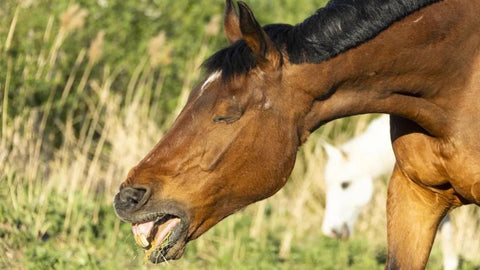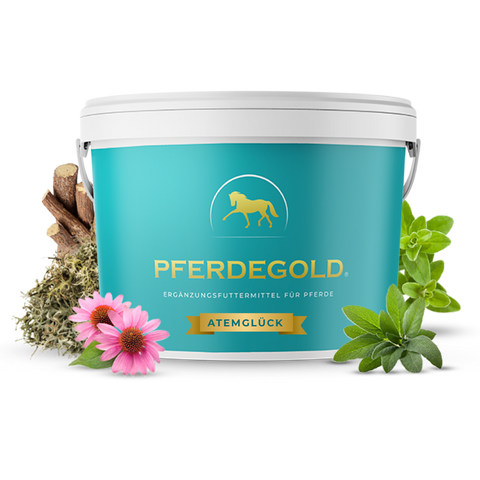
Florian ist aufgewachsen auf einem Bauernhof. Umgeben von Pferden, entdeckte er früh seine Faszination für diese majestätischen Tiere. Inspiriert von seiner reitbegeisterten Mutter, entwickelte er das Nahrungsergänzungmittel - Pferdegold. Seine tiefe Verbundenheit zur Natur und die leidenschaftliche Hingabe zu Pferden trieben ihn an, sein Unternehmen zu gründen.
Cough in horses: Identify causes, treat & successfully prevent
Coughing in horses is one of the most common and worrying Respiratory diseases , especially during the cold season. These symptoms can range from harmless colds to chronic respiratory problems and pose major challenges for horse owners.
Coughing is more than just an annoying noise—it is an important warning signal from the respiratory tract that often indicates underlying problems. If this cough becomes chronic or is left untreated, the Effects often severe and long-lasting than initially suspected.
In this comprehensive counselor You will learn everything you need to know about Cough in horses : from the first warning signs to the various causes and proven treatment methods and effective prevention strategies .

Veterinary examination - early detection prevents chronic respiratory problems
What is coughing in horses?
Coughing is a protective reflex of the respiratory tract in which foreign bodies, mucus or irritants are removed from the respiratory tract by explosively expelling air.
The cough mechanism:
When coughing, the respiratory system responds to irritation by rapidly contracting the respiratory muscles. This produces the characteristic coughing sound and is intended to clear the airways of obstructive substances and restore normal breathing.
Types of cough:
Depending on the severity, a distinction is made between acute cough (occurring suddenly, usually caused by an infection), chronic cough (lasting longer than 3 weeks) and allergic cough (reaction to environmental stimuli such as dust or pollen).
Depending on the sound characteristics, the spectrum ranges from a dry, hard cough to a wet, mucous cough to a wheezing cough when the airways are constricted.
Recognizing a cough: correctly interpreting warning signals
The perils of coughing: It can be either a harmless symptom or a sign of serious respiratory disease. Proper assessment is crucial for further treatment.
🚨 Immediate warning signs:
- Persistent, violent cough lasting several hours
- Breathing noises at rest or wheezing
- Nasal discharge with yellow-green discoloration
- Loss of appetite and significantly reduced performance
👁️ Detect early development:
- Occasional coughing at the start of work
- Increased coughing in dusty environments
- Slight breathing noises after exertion
- Increased head shaking or holding the head down
💡 Pro tip: Coughing is particularly common during the transition period between pasture and stable. Fluctuating temperatures and changing housing conditions place additional strain on the respiratory system.

Horse shows clear cough symptoms - Early detection enables successful treatment
How does a cough develop? Understanding the causes
Coughing in horses is caused by various factors that irritate or damage the delicate airways. Especially during the cold season, the airways are subjected to additional strain by dry air and stable conditions.
⚡ The main causes:
Coughing is usually caused by environmental irritants such as dusty hay, poor stable air, ammonia from the bedding or sudden changes in temperature, which irritate the sensitive mucous membranes.
Infections are also often responsible: viral or bacterial respiratory infections, which can spread quickly through close animal contact, especially during the stable season.
Particularly at risk are older horses, horses with weakened immune systems, horses in dusty stable environments or those that frequently change stables with new pathogens.
What to do if you have a cough? First aid and treatment
Quick and correct action is crucial! When it comes to coughing, the cause should always be identified first and then treated accordingly.
🛑 Immediate measures:
In the case of acute coughing, immediate action is required: Exercise must be stopped initially to avoid additional strain on the respiratory system. The stable air should be improved, and all sources of dust should be eliminated. Adequate fresh water and rest will aid recovery.
🚨 Call a vet if:
Persistent cough for more than 3 days, fever, purulent nasal discharge, or worsening general well-being. Professional diagnosis is essential for respiratory problems.
💉 Proven therapeutic approaches:
Treatment depends on the cause: Infections may require antibiotics or antiviral medications. Mucolytics, bronchodilators, or anti-inflammatory drugs support healing. Inhalation therapy can be particularly effective.

Optimal stable ventilation - Good air quality protects the sensitive horse respiratory tract
Prevention: How to protect your horse's respiratory tract
Prevention is the best protection! With optimal stable air and respiratory-friendly housing, most coughing problems can be prevented.
📈 Intelligently optimize the stable climate:
Optimal air quality:
- Adequate ventilation without drafts
- Use dust-free or steamed hay
- Regular stable cleaning and fresh bedding
Respiratory-friendly posture:
- Daily grazing or paddock stay
- Slow acclimatization to temperature changes
- Avoiding ammonia accumulation
🔍 Regular monitoring:
- Daily monitoring of respiratory rate at rest
- Observation after changing stables or feed changes
- Early reaction to first cough signals
Supportive nutrition for strong respiratory tracts
A targeted diet can contribute to respiratory health in a preventative manner. By providing important nutrients, the respiratory system is strengthened from within.
🔧 Important nutrients for healthy respiratory systems:
- Omega-3 fatty acids: Anti-inflammatory effect on the respiratory mucous membranes
- Echinacea: Traditional support for natural defenses
- Thyme: Proven herbal support for respiratory function
- Iceland moss: Natural support for irritated mucous membranes

Natural herbal support - Traditional help for healthy respiratory systems
The optimal nutrient combination in Pferdegold Respiratory Tract
- Omega-3 fatty acids: From flax meal for anti-inflammatory properties
- Echinacea: Natural support for strong immune systems
- Thyme: Traditional herbal support for the respiratory system
- Icelandic moss: Natural support for irritated mucous membranes
⚠️ Important note: Pferdegold Atemglück is not related to the disease described in this article. It does not treat any disease and is not a substitute for veterinary diagnosis or treatment. This supplement can only be used as preventative support for healthy horses.

Pferdegold® Breathing Happiness
This specially developed supplement supports natural respiratory function and promotes free, relaxed breathing. Made in Germany, grain-free, and backed by a 30-day money-back guarantee.
Order nowTreatment: The path to recovery
Patience is key! Respiratory problems require systematic treatment and sufficient recovery time.
📅 Typical treatment duration:
The healing time varies greatly depending on the cause and severity. Acute infectious coughs can clear up in 1-2 weeks, while chronic respiratory problems may take 4-8 weeks or longer. Allergic coughs require ongoing management of the triggers.
🎯 Treatment steps:
- Immediate training and exercise break (weeks 1-2)
- Optimization of housing conditions and stable air
- Drug treatment according to veterinary instructions (weeks 2-4)
- Slow training build-up after symptom relief (weeks 4-6)
- Long-term preventive measures to prevent relapse

Recovered horse respiratory system - Systematic treatment leads to complete recovery
Frequently asked questions about coughing in horses
How long does it take to heal a cough?
The healing time varies depending on the cause: 1-2 weeks for acute infectious cough, up to 8 weeks for chronic respiratory problems.
When can the horse work again?
Only after complete freedom from symptoms and veterinary clearance. Too early exercise can lead to relapses or chronic problems.
Is coughing contagious to other horses?
Infectious cough can be highly contagious. Isolation of the sick horse and increased hygiene measures are important.
Conclusion: Take coughs seriously and prevent them properly
Coughing in horses is one of the most common health problems, but it can be successfully managed through careful observation and preventative measures. It requires rapid response, consistent treatment, and, above all, patience during recovery.
The most important findings:
- Early detection through daily airway monitoring is crucial
- Optimal stable air and dust-free environment provide the best protection
- Immediate training break prevents worsening
- Treating the cause is more important than simply alleviating symptoms
The key is prevention: With optimal You can significantly reduce the risk through stable hygiene, respiratory-friendly housing and targeted support through respiratory-strengthening nutrition.
Perfect for your horse: Pferdegold® supplementary feed!
These specially developed supplements support your horse's diet and provide it with natural nutrients. Made in Germany, grain-free and drug-free, they come with a 30-day money-back guarantee.
IMPORTANT:
Pferdegold is not a substitute for veterinary diagnosis or treatment. The information contained in this article is for general informational purposes only and is intended to help improve your horse's well-being.
Pferdegold Atemglück is not related to the disease described in this article. It does not treat any disease and is not a substitute for veterinary diagnosis or treatment. This supplement can only be used as preventative support for healthy horses.
















